-
 Bitcoin
Bitcoin $117700
-1.00% -
 Ethereum
Ethereum $4458
-3.91% -
 XRP
XRP $3.119
0.14% -
 Tether USDt
Tether USDt $1.001
-0.02% -
 BNB
BNB $836.6
-1.56% -
 Solana
Solana $189.5
-3.90% -
 USDC
USDC $0.9998
-0.02% -
 Dogecoin
Dogecoin $0.2335
1.29% -
 Cardano
Cardano $0.9642
1.51% -
 TRON
TRON $0.3539
-1.19% -
 Hyperliquid
Hyperliquid $47.41
-1.84% -
 Chainlink
Chainlink $21.92
-3.28% -
 Stellar
Stellar $0.4286
-0.23% -
 Sui
Sui $3.724
-3.29% -
 Bitcoin Cash
Bitcoin Cash $594.8
-0.78% -
 Ethena USDe
Ethena USDe $1.001
0.04% -
 Hedera
Hedera $0.2501
-2.06% -
 Avalanche
Avalanche $23.96
-4.87% -
 Litecoin
Litecoin $119.0
-2.32% -
 Toncoin
Toncoin $3.473
0.82% -
 UNUS SED LEO
UNUS SED LEO $9.596
0.17% -
 Shiba Inu
Shiba Inu $0.00001301
-0.39% -
 Uniswap
Uniswap $11.03
-0.25% -
 Polkadot
Polkadot $3.935
-2.62% -
 Dai
Dai $1.000
0.01% -
 Bitget Token
Bitget Token $4.564
-1.76% -
 Cronos
Cronos $0.1512
-4.11% -
 Ethena
Ethena $0.7306
-1.09% -
 Pepe
Pepe $0.00001087
-2.68% -
 Aave
Aave $300.2
-4.00%
How to export the private key after the Ethereum wallet address is generated?
Never share your Ethereum private key; accessing it depends on your wallet type (software, hardware, paper, or seed phrase). Losing access may mean losing your funds, so prioritize secure storage and backups.
Mar 25, 2025 at 09:28 pm
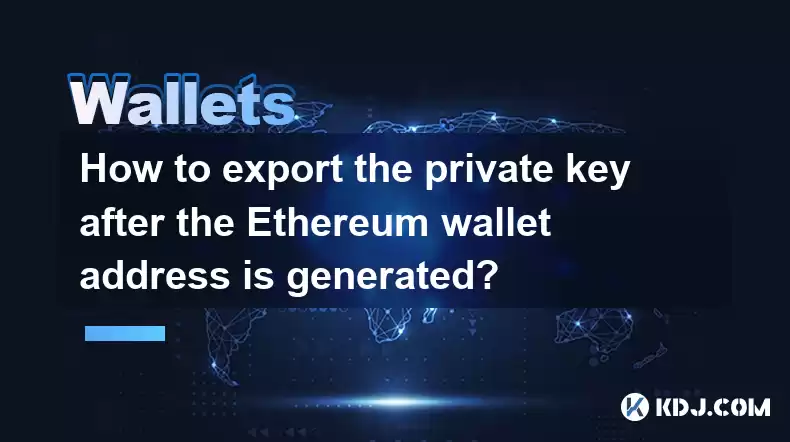
Key Points:
- Ethereum private keys are not directly "exported" after address generation. The process involves revealing or deriving the private key from your chosen secure storage method.
- Never share your private key with anyone. Compromising it grants complete control over your funds.
- The method for accessing your private key depends entirely on how you generated and stored your Ethereum wallet. Different wallets employ different security measures.
- If you've lost access to your wallet, recovering your private key may be impossible, depending on your security setup.
How to Access Your Ethereum Private Key After Address Generation
The concept of "exporting" a private key after generating an Ethereum wallet address is misleading. The private key is inherently linked to the wallet creation process. You don't export it; you either already possess it securely stored, or you need to access it via the methods your wallet provider offers. There's no universal "export" button.
Accessing Private Keys from Different Wallet Types
The method of accessing your private key differs drastically depending on the type of wallet you used:
- Software Wallets (e.g., MetaMask, Trust Wallet): These wallets typically store your private key securely encrypted within the application. The exact method for viewing it varies; some may provide a "reveal" option, often requiring password confirmation, while others may not directly show it for security reasons. Consult your wallet's documentation for specific instructions.
- Hardware Wallets (e.g., Ledger, Trezor): These wallets are known for their enhanced security. Your private key never leaves the hardware device. You won't find an "export" feature; instead, you interact with the wallet using the device's interface. Attempting to extract the private key directly from the device could be extremely risky and may permanently damage your wallet.
- Paper Wallets: These are offline methods involving printing your public and private key pair on paper. Your private key is printed directly on the paper. However, ensure you've securely stored this paper wallet, as its loss means loss of access to your funds.
- Mnemonic Phrase (Seed Phrase): Many wallets use a mnemonic phrase, a series of 12 or 24 words, to derive your private key. This phrase acts as a master key. If you have your seed phrase, you can use it to restore your wallet on a new device or software. Never share your seed phrase with anyone.
Understanding the Risks
It's crucial to understand the inherent risks involved in accessing your private key:
- Security Breach: If your computer or device is compromised, revealing your private key directly exposes your funds to theft.
- Malware: Malicious software can steal your private key if you're not using a secure and updated system.
- Phishing: Scammers may try to trick you into revealing your private key through phishing attempts. Never enter your private key on suspicious websites or respond to unsolicited requests for this information.
Steps to Take (If Applicable) for Specific Wallets
Let's explore a few examples. Remember, always consult your specific wallet's documentation for precise instructions.
- MetaMask: MetaMask prioritizes security. Direct access to the private key might not be readily available. Focus on securing your password and seed phrase. If you need to recover your wallet, use your seed phrase.
- Ledger Nano S: Your private key remains securely on your Ledger device. You interact with the Ethereum blockchain using the device's interface. There's no export function.
- Trust Wallet: Similar to MetaMask, Trust Wallet prioritizes security and might not provide direct access to the private key. Focus on securing your password and seed phrase.
If you lost access to your wallet, recovering the private key may be challenging or impossible. Depending on your security setup, recovering access to your funds could be as simple as using your mnemonic phrase, or nearly impossible if you didn't have proper backup procedures in place.
Frequently Asked Questions
Q: Can I export my Ethereum private key from a hardware wallet?
A: No, reputable hardware wallets do not offer a direct "export" function for your private key. The key remains securely on the device itself. Attempting to extract it might permanently damage the device.
Q: Is it safe to store my private key on my computer?
A: No, storing your private key on your computer is highly insecure. Your computer is vulnerable to malware and hacking attempts. Consider using a hardware wallet or a well-secured paper wallet for optimal security.
Q: What if I lost my seed phrase?
A: Losing your seed phrase usually means irreversible loss of access to your Ethereum funds. There is no way to recover your private key without it.
Q: Can I generate a new private key from my Ethereum address?
A: No, you cannot generate a new private key from your Ethereum address. The address is derived from the private key, not the other way around. The private key is the only way to control the funds associated with that address.
Q: My software wallet doesn't show my private key. What should I do?
A: This is a standard security practice for many software wallets. Focus on securing your password and seed phrase. If you need to access your funds on a new device, use your seed phrase to restore your wallet.
Disclaimer:info@kdj.com
The information provided is not trading advice. kdj.com does not assume any responsibility for any investments made based on the information provided in this article. Cryptocurrencies are highly volatile and it is highly recommended that you invest with caution after thorough research!
If you believe that the content used on this website infringes your copyright, please contact us immediately (info@kdj.com) and we will delete it promptly.
- Kazakhstan's Crypto Leap: Bitcoin ETF and Central Asia's Digital Finance Future
- 2025-08-13 12:45:19
- BlockDAG Presale Blazes Past $371M: Fundraising Frenzy Fuels Crypto Sensation
- 2025-08-13 13:05:21
- Meme Coins: Chasing the 2025 Surge – Which Will Moonshot?
- 2025-08-13 10:25:23
- Bitcoin's Wild Ride: Rally, Pullback, and What's Next
- 2025-08-13 10:25:23
- Bitcoin, Bitmax, and Institutional Demand: A New Era of Crypto Investment
- 2025-08-13 10:45:12
- Solana, ROAM, and Airdrops: What's the Buzz in 2025?
- 2025-08-13 11:35:13
Related knowledge
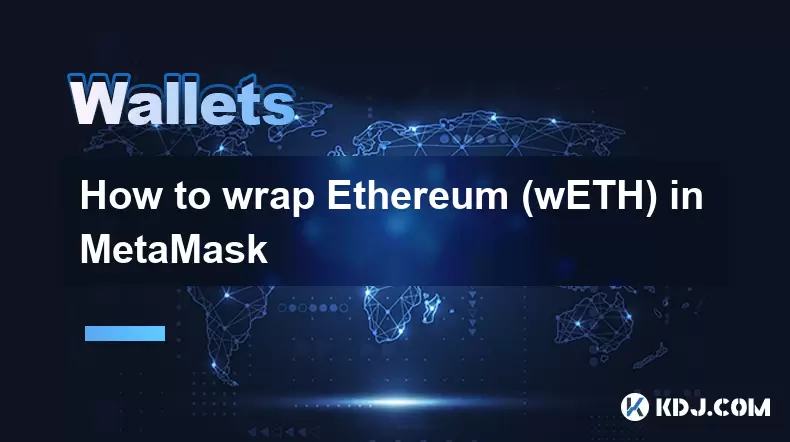
How to wrap Ethereum (wETH) in MetaMask
Aug 13,2025 at 11:36am
Understanding Wrapped Ethereum (wETH)Wrapped Ethereum (wETH) is a tokenized version of native Ethereum (ETH) that conforms to the ERC-20 standard, ena...

How to manage your portfolio in Exodus wallet
Aug 08,2025 at 10:07pm
Understanding the Exodus Wallet InterfaceThe Exodus wallet is a non-custodial cryptocurrency wallet that supports a wide range of digital assets. When...
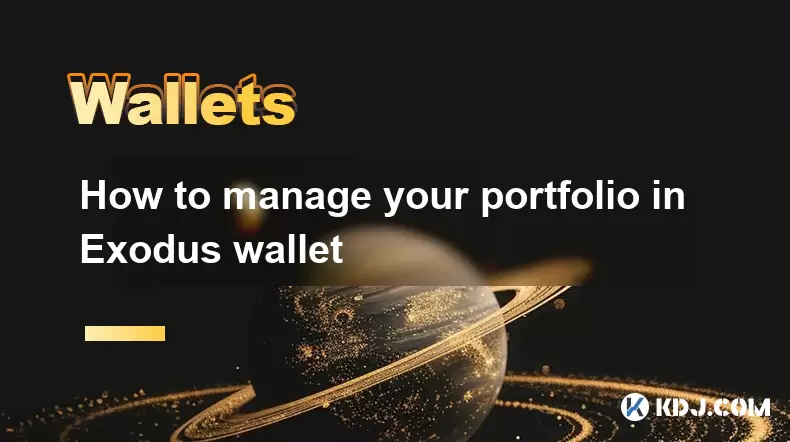
How to manage your portfolio in Exodus wallet
Aug 13,2025 at 11:35am
Understanding the Exodus Wallet InterfaceThe Exodus wallet is a non-custodial cryptocurrency wallet that supports a wide range of digital assets. Upon...

How to reset your MetaMask password
Aug 08,2025 at 01:28pm
Understanding the MetaMask Password Reset ProcessMany users confuse the MetaMask password with the seed phrase or private key, but they serve differen...
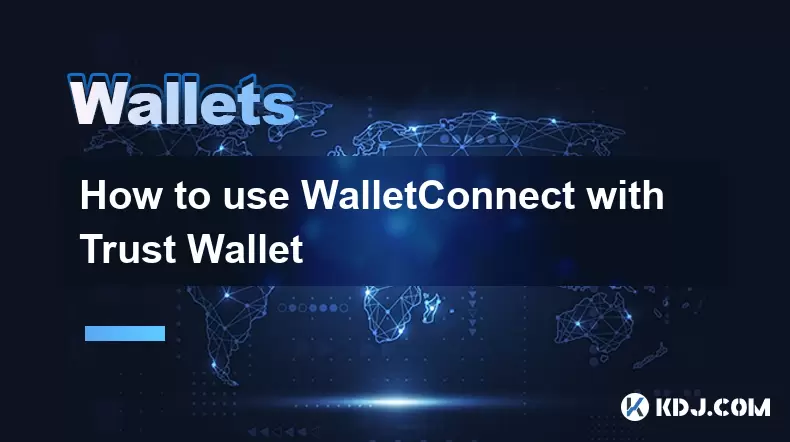
How to use WalletConnect with Trust Wallet
Aug 13,2025 at 01:07am
What Is WalletConnect and Why It Matters for Trust Wallet UsersWalletConnect is an open-source protocol that enables secure communication between dece...
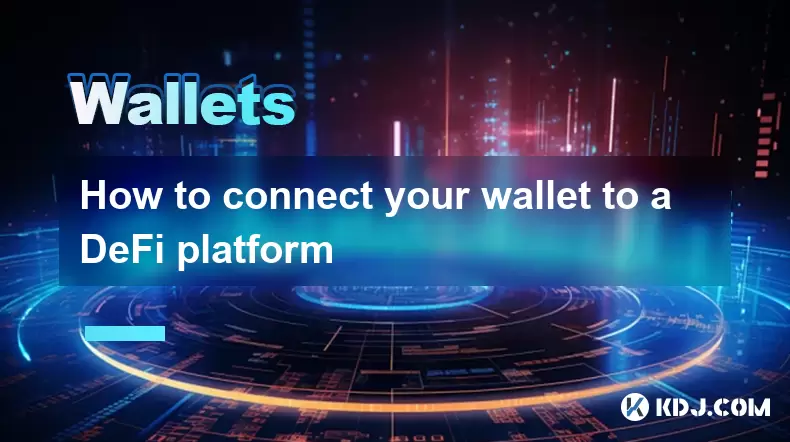
How to connect your wallet to a DeFi platform
Aug 13,2025 at 11:36am
Understanding Wallet Compatibility with DeFi PlatformsBefore connecting your wallet to any DeFi platform, it's essential to ensure your wallet is comp...

How to wrap Ethereum (wETH) in MetaMask
Aug 13,2025 at 11:36am
Understanding Wrapped Ethereum (wETH)Wrapped Ethereum (wETH) is a tokenized version of native Ethereum (ETH) that conforms to the ERC-20 standard, ena...

How to manage your portfolio in Exodus wallet
Aug 08,2025 at 10:07pm
Understanding the Exodus Wallet InterfaceThe Exodus wallet is a non-custodial cryptocurrency wallet that supports a wide range of digital assets. When...

How to manage your portfolio in Exodus wallet
Aug 13,2025 at 11:35am
Understanding the Exodus Wallet InterfaceThe Exodus wallet is a non-custodial cryptocurrency wallet that supports a wide range of digital assets. Upon...

How to reset your MetaMask password
Aug 08,2025 at 01:28pm
Understanding the MetaMask Password Reset ProcessMany users confuse the MetaMask password with the seed phrase or private key, but they serve differen...

How to use WalletConnect with Trust Wallet
Aug 13,2025 at 01:07am
What Is WalletConnect and Why It Matters for Trust Wallet UsersWalletConnect is an open-source protocol that enables secure communication between dece...

How to connect your wallet to a DeFi platform
Aug 13,2025 at 11:36am
Understanding Wallet Compatibility with DeFi PlatformsBefore connecting your wallet to any DeFi platform, it's essential to ensure your wallet is comp...
See all articles

























































































